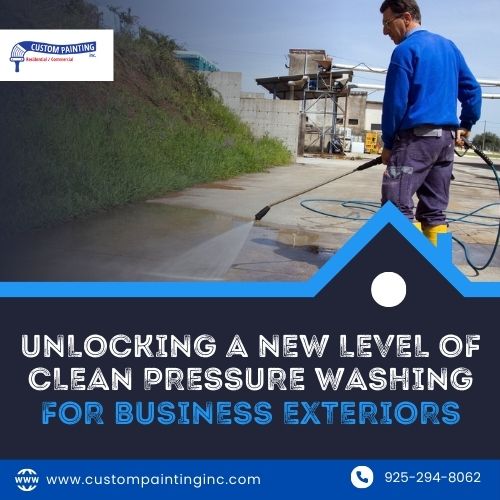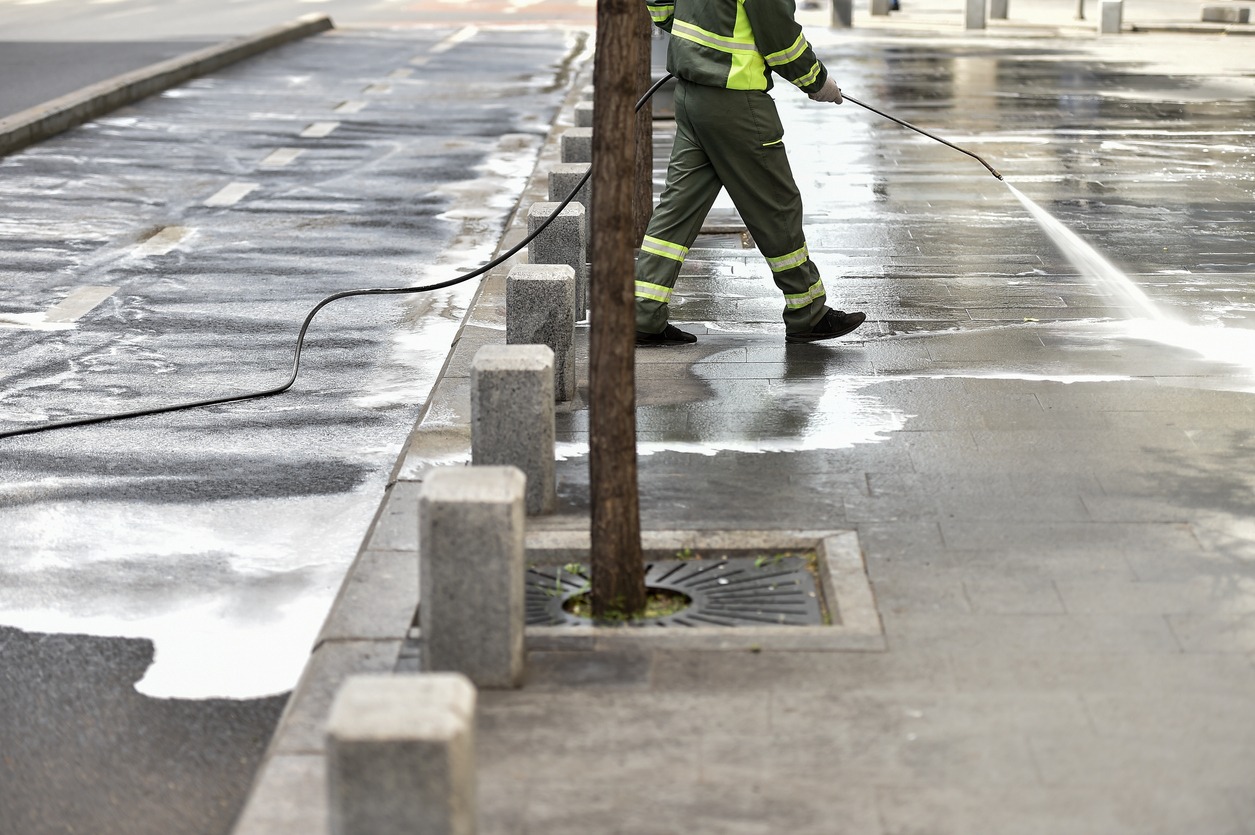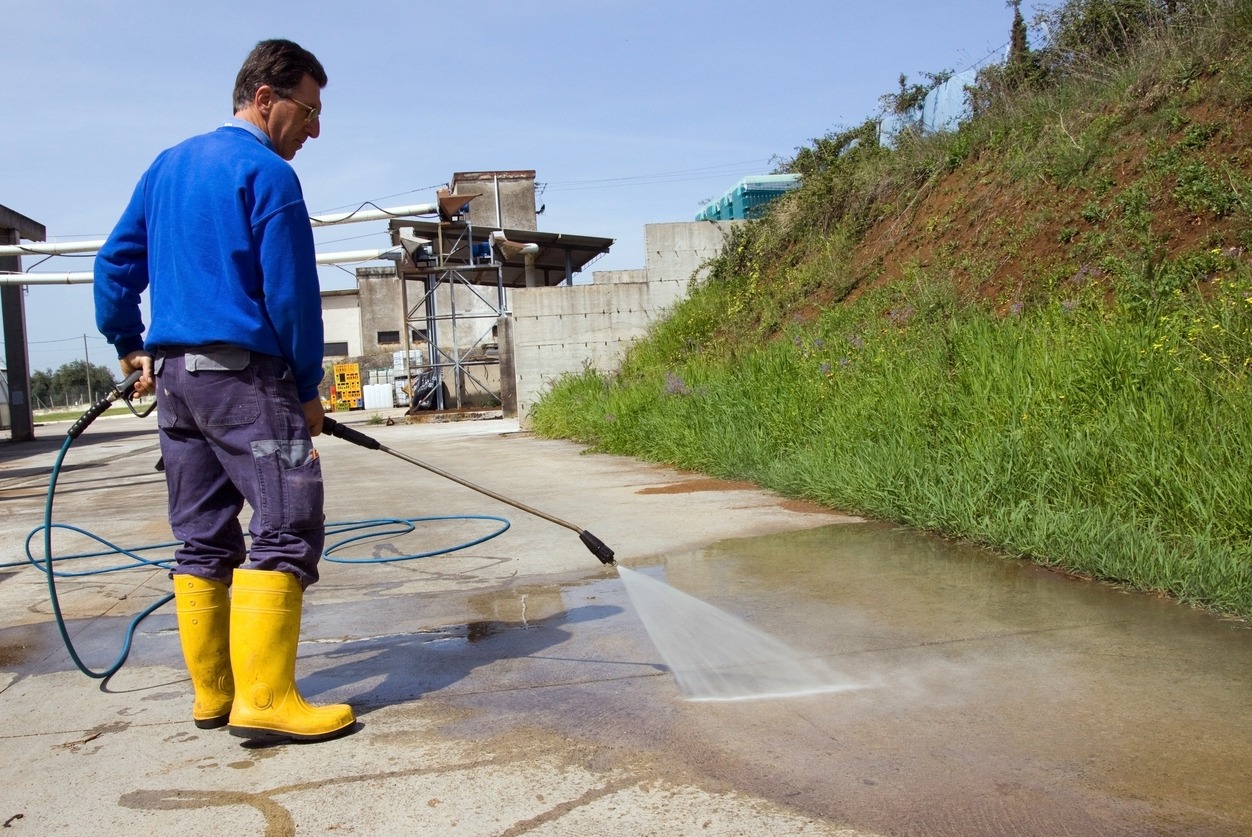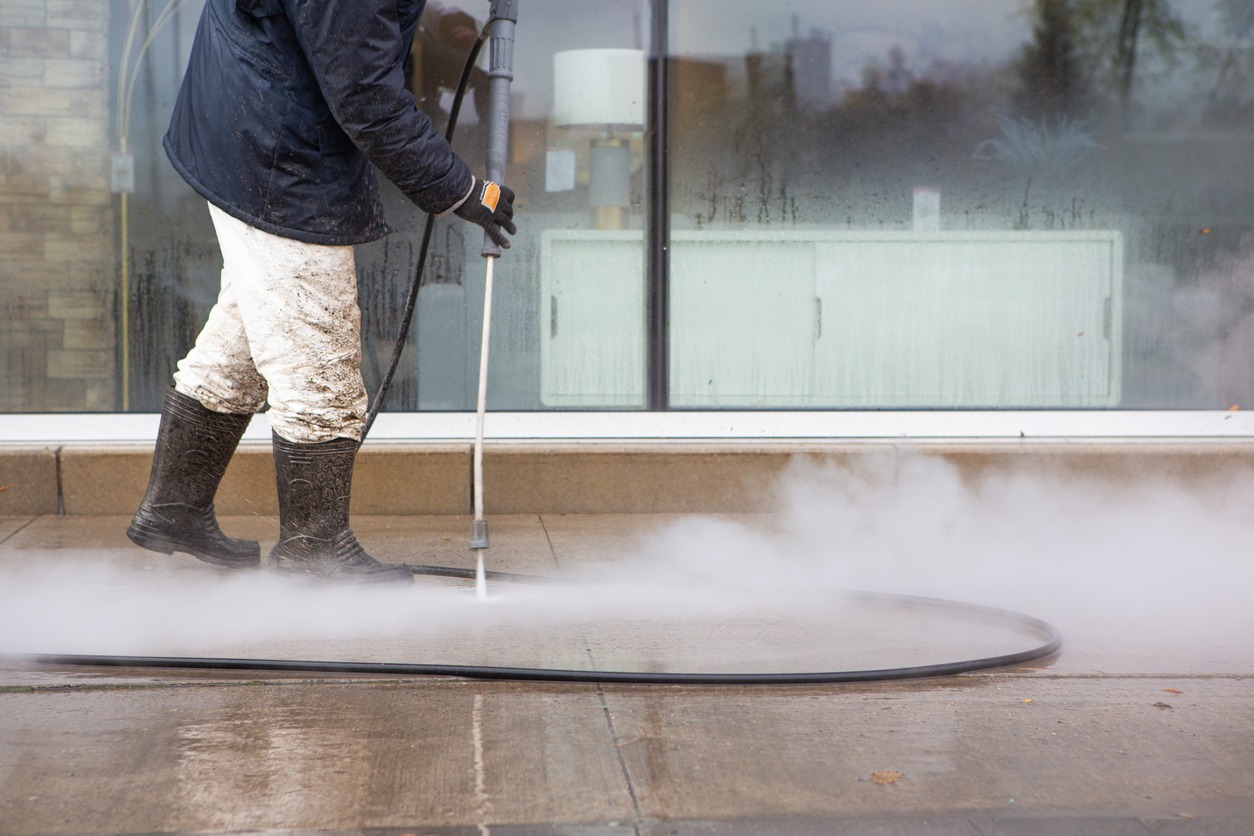A clean and well-maintained business exterior attracts potential customers and sets a professional standard. Companies today can achieve cleanliness for their office buildings, storefronts, and commercial properties through professional pressure washing services.
This article discusses how pressure washing allows businesses to enhance their curb appeal effectively and efficiently. Let us learn how modern pressure-washing techniques can transform the exterior of your business and drive success.
The Basics of Pressure Washing
Pressure washing is a cleaning method that uses high-pressure water spray. It is used to remove dirt, grime, mold, mud, and unwanted substances from buildings and concrete surfaces. It involves propelling water at high speeds to blast away stubborn stains and buildup that regular cleaning methods can’t handle. The force of the water is strong enough to tackle tough cleaning jobs without the need for harsh chemicals. This makes it a preferred choice for eco-friendly cleaning.
Types of Pressure Washers
Pressure washers come in various designs for different cleaning needs. They are primarily categorized into electric and gas-powered models.
1. Electric Pressure Washers:
- Suitability: Ideal for light to moderate cleaning tasks such as washing cars, outdoor furniture, and small patios.
- Features: These washers are quieter, lighter, and generally easier to start and maintain than their gas counterparts. They emit no exhaust fumes, making them environmentally friendly and suitable for indoor use or in poorly ventilated areas.
- Power Range: It typically offers between 1,300 and 1,700 pounds per square inch (PSI) of pressure, which is sufficient for most residential cleaning tasks.
2. Gas-Powered Pressure Washers:
- Suitability: Best suited for heavy-duty cleaning jobs, including large areas like driveways, siding, and decks.
- Features: These models are more powerful, with PSI ratings from about 2,000 to over 3,000. They are portable as they do not require a plug point but are louder and emit exhaust due to their gas engines.
- Power Range: Higher PSI and gallons per minute (GPM) ratings mean faster cleaning and the ability to handle tougher grime and stains.
Choosing between electric and gas-powered pressure washers depends largely on the scale of the cleaning tasks at hand and the specific needs of the user. Both types provide advantages that can cater to different cleaning environments and requirements.
Benefits of Pressure Washing for Business Exteriors
Pressure washing offers a lot of benefits for business exteriors. Here are some of the key advantages:
- Enhanced Curb Appeal: Pressure washing instantly improves the appearance of a business exterior, making it look more inviting to customers. A clean, well-maintained facade can attract more customers and help a business stand out in a competitive marketplace. It’s an effective way to boost the visual impact without extensive renovations.
- Preventative Maintenance: Regular pressure washing can prevent the build-up of dirt, mold, algae, and bird droppings, which can degrade building materials over time. By removing these substances, pressure washing helps preserve the siding, masonry, and other exterior materials, potentially saving businesses money on costly repairs and replacements.
- Health and Safety: Removing pollutants, allergens, and mold through pressure washing can significantly improve the health conditions around the premises. This is important for businesses like restaurants, hospitals, and schools. Pressure washing walkways, parking lots, and entrances can remove slippery substances like algae and oil, reducing the risk of slips and falls.
- Increase Property Value: A clean and well-maintained building exterior adds to the property’s value. This is beneficial for businesses looking to attract tenants, buyers, or investors. Pressure washing is a cost-effective way to enhance the building’s facade, which can directly impact its market value.
- Preparation for Other Projects: Pressure washing is often done before painting and refinishing projects. It ensures that surfaces are clean and free of debris that could hinder paint adhesion and other coatings. This makes it an essential first step in any exterior renovation or upkeep project.
- Environmental Compliance: Using pressure washing as a cleaning method can help businesses comply with local environmental regulations by avoiding the use of harmful chemicals. Many pressure washing units are designed to work effectively with water alone or with eco-friendly cleaning agents, reducing the risk of environmental contamination.
Common Applications of Pressure Washing for Businesses
Here are some common applications of pressure washing for businesses:
- Building Facades: Maintaining a building’s exterior is crucial for any business. Pressure washing can effectively remove dirt, bird droppings, and stains caused by air pollution and weather conditions. This is important for businesses in urban environments or those located near busy streets, where buildings can accumulate grime quickly.
- Walkways and Sidewalks: Clean walkways are appealing and safer for customers and employees. Pressure washing can remove hazardous materials like oil, mold, and mildew, which can cause slips, especially in wet conditions. Regular cleaning also keeps pathways looking professional and welcoming.
- Parking Lots and Garages: These areas are prone to accumulating oil stains, tire marks, and debris. Pressure washing can clean these surfaces thoroughly. It improves the overall look of the parking area and enhances the durability of the surface by removing corrosive substances.
- Outdoor Dining and Common Areas: For businesses like cafes and restaurants, outdoor dining areas must be kept clean to attract and retain customers. Pressure washing can efficiently clean furniture, patios, decks, and other outdoor surfaces, creating a more enjoyable and hygienic dining experience.
- Signage and Awnings: Clean signage is essential for making a good first impression. Pressure washing can help restore the brightness of business signs and awnings, ensuring they are readable and attractive from a distance.
- Dumpster Areas: Regular pressure washing helps manage waste residue and minimizes unpleasant odors, which can be crucial for businesses in the food service industry.
- Drive-Thrus: Businesses like banks and fast-food restaurants benefit from clean drive-thru lanes. These areas usually experience high vehicle traffic and can accumulate oil, grease, and debris. A clean drive-thru enhances customer experience and maintains an orderly appearance.
- Loading Docks: These areas are critical for businesses that deal with shipping and receiving goods. Keeping loading docks clean with pressure washing prevents the buildup of dirt and debris that can make these areas unsafe and inefficient.
Each of these applications demonstrates how pressure washing is an effective and efficient method for maintaining various outdoor business areas.
Professional Pressure Washing Techniques
Here’s how professionals approach pressure washing:
Effective Cleaning Strategies
- Pre-Cleaning Inspection: Before starting the pressure washing process, it’s essential to inspect the area and assess the type of dirt and stains present. This step helps you choose the right cleaning agents and equipment settings.
- Systematic Approach: Cleaning in a methodical pattern (e.g., top to bottom and left to right) ensures thorough and uniform coverage. This prevents streaking and missed spots, which are common when the cleaning is done haphazardly.
- Appropriate Nozzle Choice: Using the correct nozzle is crucial for effective cleaning. Different nozzles provide various spray angles, allowing for more or less pressure. For instance, a 0-degree nozzle creates a high-pressure, pinpoint spray for tough stains, while a wider 40-degree nozzle is better for general cleaning over larger surfaces.
- Consistent Distance: Maintaining a consistent distance between the nozzle and the surface is vital. Too close can damage the surface; too far can reduce the effectiveness. Typically, a distance of about 12 to 18 inches is recommended, but this can vary based on the pressure washer’s power and the surface being cleaned.
Adjusting Pressure Levels
- Understanding Surface Materials: Different materials can withstand different levels of pressure. For example, concrete can handle high pressure, while painted surfaces or wood may require a gentler approach.
- Tailoring Pressure Settings: Adjust the pressure washer settings according to the surface material and the amount of dirt. Higher pressure is useful for removing tough grime from hard surfaces like concrete, while lower pressure should be used for delicate surfaces to avoid damage.
- Test in a Small Area: Always start by testing the pressure in a small area to ensure it won’t damage the surface. This can help determine the right pressure setting for the entire area.
Eco-Friendly Practices
- Environmentally Safe Soaps and Detergents: Choose biodegradable, phosphate-free, and solvent-free cleaning agents. These products effectively clean surfaces without harming the environment or risking harm to plants and animals around the cleaning site.
- Water Conservation: Techniques such as recycling water used during pressure washing can significantly reduce water usage. Using pressure washers designed to maximize cleaning efficiency while minimizing water flow is also beneficial.
- Proper Waste Management: Ensure runoff water is managed correctly to prevent pollution of nearby soil and water bodies. This may involve setting up containment systems or recovery mats to capture and dispose of wastewater appropriately.
Choosing a Pressure Washing Service
Here are the key factors to consider when selecting a pressure-washing company:
- Experience and Reputation: Look for a company with a proven track record in pressure washing. Experienced professionals understand the nuances of different materials and can adjust their methods accordingly. Check reviews and testimonials from previous customers. A reputable company should have positive feedback regarding their professionalism and the quality of their work.
- Licensing and Insurance: Ensure the company is licensed to operate in your area. This confirms their legitimacy and shows they comply with local business regulations. A professional pressure washing service should carry liability insurance and workers’ compensation. This protects you from liability in case of accidents or damages during the cleaning process.
- Equipment and Techniques: The type of equipment used can affect the outcome of the cleaning job. Professional companies invest in high-quality, commercial-grade pressure washers and accessories. The company should use techniques appropriate for different types of surfaces to avoid damage. Ask about their approach to handling delicate features like siding, windows, or decorative details.
- Eco-Friendliness: Inquire about the types of cleaning solutions used. Eco-friendly services use biodegradable, non-toxic agents that are effective without harming the environment or posing health risks. Consider companies that implement water conservation practices, reflecting responsibility towards environmental concerns.
- Services Offered: Ensure the company offers the specific services you need. Some companies specialize in residential properties, while others might focus on commercial or industrial projects. A good service provider should be able to tailor their services to your specific needs, whether it’s a gentle wash for delicate areas or a deep clean for heavily soiled parts.
- Pricing and Value: Reliable companies provide clear, upfront pricing without hidden fees. Ask for detailed quotes to understand what you are paying for. The cheapest option isn’t always the best. Consider the value provided, including guarantees of quality and longevity of the cleaning effects.
- Customer Service: Good customer service is indicative of how a company conducts its business. Responsive, courteous interactions suggest a company that values its clients and is likely to handle your project with care.
- Availability and Flexibility: Choose a service that can accommodate your schedule and complete the job within a reasonable timeframe. Flexibility in handling urgent requests or specific time frames can be a significant advantage.
Selecting the right pressure washing service involves assessing these various aspects to ensure you receive quality service that meets your needs and budget.
Conclusion
Pressure washing is indeed one of the best ways to keep your business exteriors clean and appealing. Selecting the right pressure washing service is essential for maintaining and enhancing the appearance and longevity of your property. Custom Painting, Inc. offers professional and reliable pressure washing services tailored to meet your specific needs. Ensure your property receives the care it deserves by reaching out to us today. Call us at 925-294-8062 or fill out our contact form to get started. Let us help you achieve that perfect clean!




